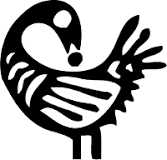
Sankofa Theory
The Adinkra people are an Akan tribe of Ghana, West of Africa. Their symbol is a bird called Sankofa. Like many African tribes, the Akan’s literature found in their rich oral traditions and symbols. The Sankofa (shown below) is not just a bird, it is orature.

Sankofa teachings have now been collected into an academic theory. The theory can be summarised as for you to successfully go forward, you need to look back. The Sankofa principle can be applicable or understood as follows:
| Aspect | Look Back (behind or past) to move ahead (front or future) |
| Knowledge (e.g. philosophies, orature, theories or frameworks) | Use philosophies, oratures, theories or frameworks of the past to shape the future |
| Practice (e.g. reflection and critical thinking) | Look back to learn to improve your practice |
| Pedagogies (e.g. teaching and learning) | Look back for pedagogies |
| Social work (e.g. social welfare, social assistance, community work and development) | Leave no one behind |
| Present socio-economic circumstances (poverty) | Consider the importance and contribution of history |
| Culture | Look back to where you come from |
| History | Value your history. History of families is important in understanding their present situation and aspirations. |
| Learning (e.g. assessment and teamwork) | A Sankofa assessment asks students to use the past to inform the present and future. |
| Research (e.g. ethics and literature review) | Look at literature already there before new research. Past literature is useful for current research |
| Family, relations or community | If you succeed, support others to succeed. I am because we are. |
Some sources
Bangura, A. K. (2011). African-Centered Research Methodologies: From Ancient Times to the Present. San Diego: Cognella.
Muzerengi, Tapiwa & Gudyani, Shepherd. (2023). The Sankofa Methodology: A Pan-African Approach to Poverty Alleviation. 10.1007/978-3-031-21841-5_10.
More theories of Africa.
Use the form below to subscibe to Owia Bulletin.
Discover more from Africa Social Work & Development Network | Mtandao waKazi zaJamii naMaendeleo waAfrika
Subscribe to get the latest posts sent to your email.




You must be logged in to post a comment.